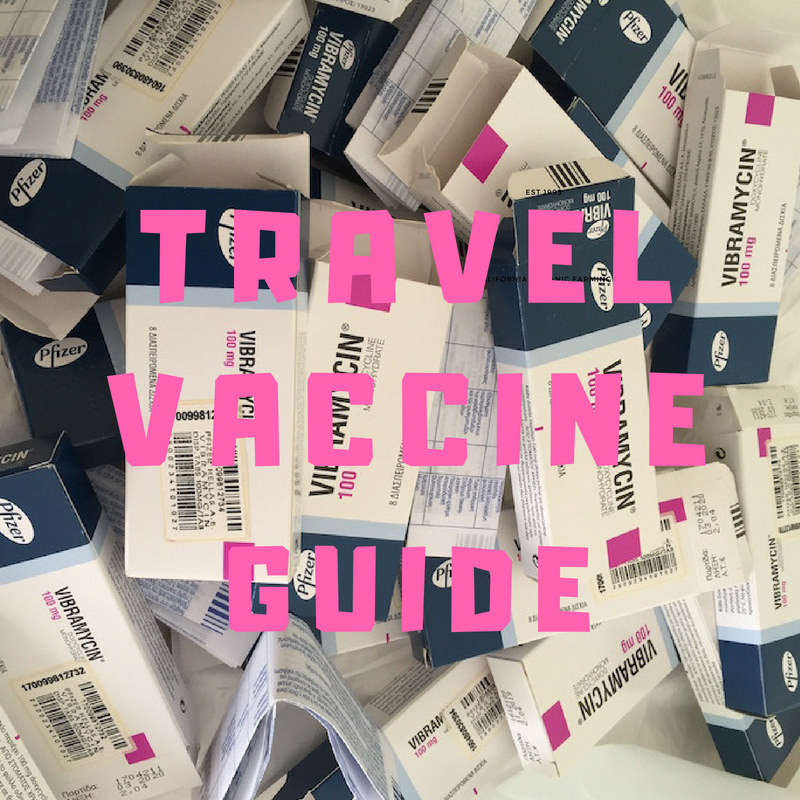Are you planning an international trip? I know how exciting this can be. I also know how easy it is to forget about travel vaccines when you are planning fun places to visit and sites to see. It can also be stressful finding a travel health specialist.
Depending on where you’re traveling, you may need some pills or injections to protect you from certain diseases. In this article we’ll answer some common questions about travel vaccines so you can be protected for your trip.
The Centers for Disease Control and Prevention(CDC) and the World Health Organization (WHO) provides excellent online resources for determining which routine vaccines you should be up to date on before travel. The site also includes information about which travel vaccines and medicines are highly recommended before travel due to a high risk of disease in the country you will visit.
What is a vaccine?
Vaccines introduce small amounts of virus or bacteria (antigens) into your body so that you can build protection (antibodies) in case you are exposed. A vaccine is given by injection (into your muscle or under your skin) or by mouth (e.g., capsule, tablet, or liquid). Vaccines are both “live” (attenuated or weakened) or “killed” (inactivated).
What do you need to do?
Make sure to schedule an appointment with your family physician or certified international travel medicine pharmacist about 4 to 6 weeks before you travel. This will allow enough time for the vaccine to work and you to receive important health advice. You can also check with your local health department or find a travel clinic in your area to administer your pre-travel vaccinations.
*The Japanese Encephalitis (JE) vaccine is given as a 2-dose series, with the doses spaced 28 days apart. So make sure to plan accordingly. The Yellow Fever (YF-Vax) vaccine requires administration at an authorized vaccine center.
What is the difference between routine vaccinations, recommended vaccinations, and required vaccinations?
Routine vaccinations protect from diseases still common in many parts of the world yet rarely occur in the United States. Recommended vaccinations protect travelers from diseases present in other parts of the world. They also help prevent infectious diseases from crossing international borders when travelers travel from one country to another.
The recommended vaccine you’ll need depends on many factors such as where you’ll be visiting, age, health status, previous vaccinations, how long you’ll be staying, the time of year you’ll be traveling, what activities you’ll partake in, and if you are traveling from a country other than the United States.
*Currently, the only vaccine required by International Health Regulations (IHR) of the WHO is the YF-Vax vaccination for travel to certain countries in sub-Saharan Africa and tropical South America. In addition, the meningococcal vaccination is required by the government of Saudi Arabia for annual travel during the Hajj Pilgrimage. Travelers to these areas must show proof of vaccination on a valid International Certificate of Vaccination or Prophylaxis, or a visa won’t be issued.
Does age matter?
Special precautions should be taken to ensure that infants and young children are protected against foodborne illnesses and mosquito bites since not all vaccines can be administered to all ages.
What about experienced travelers?
Frequent travelers often become careless about taking health precautions when traveling many times without having major health issues. As a result, these travelers pose a health risk to themselves and others after returning home or traveling to another country.
What if I am pregnant?
Pregnancy should never deter a traveler from receiving vaccines. However, use caution when selecting the appropriate vaccine to avoid the inappropriate administration of certain vaccines that could harm the unborn baby. Live vaccines shouldn’t be administered to pregnant women.
What if I have a chronic medical condition?
Travelers with chronic medical conditions or a weakened immune system may be at risk for developing complications if given a live vaccine. Therefore, these patients should always consult with a physician or a certified vaccination healthcare provider before receiving a live vaccine.
Will the influenza vaccine I receive in the United States protect me during my international travels?
The influenza (flu) vaccine used in one part of the world usually protects against the main flu viruses circulating in other parts of the world. The risk to travelers getting the flu depends on the time of year and destination of travel.
The WHO recommends the annual influenza vaccine for people at risk of severe influenza complications and travelers who have not received the influenza vaccine traveling to parts of the world with current influenza activity.
Vaccination is a highly effective way of preventing certain illnesses during your travels. Vaccines, in general, are very safe, and serious adverse reactions are uncommon. It’s important to know that you can’t get sick from vaccines, but side effects are possible. The most common side effects include pain or redness at the injection site, tiredness, headache, or mild fever.
Routine vaccines protect most of the world’s children from many infectious diseases that once caused millions of deaths each year. Vaccines are not 100% effective in protecting you against illness.
Vaccines are not a substitute for practicing good travel hygiene practices. The single most important thing you can do before travel is to make an appointment with your family physician, certified international travel medicine pharmacist, local health department, or travel clinic to receive the appropriate vaccine travel counsel before your next travel adventure.
The type of travel vaccine or medication you’ll need will depend on your travel plans, medical history, risk factors, and vaccination history. As soon as you are thinking about booking an international trip, find out where you can make an appointment to see a travel health specialist.
